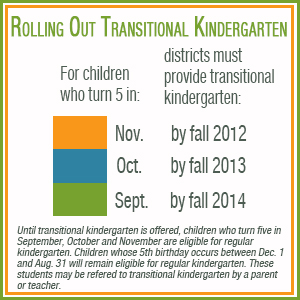
A girl practices counting to 100 in a transitional kindergarten classroom in Los Angeles. Credit: Lillian Mongeau, EdSource Today
Greatly expanding transitional kindergarten so that it is available to all 4-year-olds is listed among the top fiscal priorities of Assembly Democrats in the coming year.
The proposal – part of a larger call to beef up funding for early education programs in the state – is listed as one of seven priorities identified in a “budget blueprint” for next year prepared by the California State Assembly Democratic Caucus. The blueprint guides the Assembly as it works with the governor and the Senate to craft a state budget for fiscal year 2014-15. The early education portion of the proposal also calls for strengthening early care programs for infants and toddlers. In an era when Democrats do not need Republican support to pass a budget, the proposal potentially carries significant weight.
“If we are talking about wanting to close the achievement gap then the evidence is overwhelming that the best way to do that is early education,” said Assemblyman Al Muratsuchi, D-Torrance, chair of the Budget Subcommittee on Education Finance. “We just need to conform our budget priorities to the evidence.”
Transitional kindergarten was offered for the first time in nearly every school district during the 2012-13 school year as an extra grade level for children who turn five during the first three months of the school year and are too young for traditional kindergarten. When the program is fully implemented next fall, only about a quarter of the state’s children will be eligible to participate, based on the current age restrictions.
In contrast, the Democratic Caucus’s proposal would open transitional kindergarten to any child who turns 4 by Sept. 1.
 While the proposal is still in very preliminary stages – there’s not even an estimated price tag yet – early education advocates say it’s significant that early education is being given prominence in early budget discussions. Increasing funding for higher education is the only other education initiative outlined in the blueprint; no K-12 initiatives are mentioned.
While the proposal is still in very preliminary stages – there’s not even an estimated price tag yet – early education advocates say it’s significant that early education is being given prominence in early budget discussions. Increasing funding for higher education is the only other education initiative outlined in the blueprint; no K-12 initiatives are mentioned.
“To have the Assembly Democrats state (early education) as a priority raises its visibility and underlines the support for this,” said Deborah Kong, vice president of policy for Early Edge California, an advocacy group for early childhood initiatives.
Early education suffered badly during the recession, losing $1 billion and 100,000 spots for children in publicly funded child care and preschool programs. Some of those dollars and spots were restored in the 2013-14 budget, but the state’s preschool program for children under 5 from low-income families is still smaller and less well-funded than it was before the recession.
Expanding transitional kindergarten would be a worthwhile investment in the state’s future, said Muratsuchi, who calls himself a “true believer” in the power of preschool.
“This fits into our ongoing strategy (of making) more constructive investments in our children with the long-term goal of trying to reduce our prison expenditures,” Muratsuchi said.
Research has shown that students who attend preschool are more likely to graduate from high school and less likely to end up in jail or on welfare.
Muratsuchi plans to hold hearings on the proposal in early 2014.
Gov. Jerry Brown has not made a statement about the proposal yet, though it already faces some Republican opposition.
Assemblywoman Kristin Olsen, R-Modesto, vice-chair of the Budget Subcommittee on Education, said expanding transitional kindergarten shouldn’t be a budget priority for the state this year. Olsen said she wishes the state could offer the optional pre-kindergarten program to all 4-year-olds, but doesn’t think it’s fiscally feasible.
“We just don’t have enough money for universal transitional kindergarten in California right now,” Olsen said. Before launching such a program, she said, “I would want to see (us) rebuild a healthy reserve of 10 percent (in the state budget) and (make) a plan to pay off our long-term debt.”
Schools are already working on several major new initiatives over the next two years, Olsen said. School leaders must implement a new set of learning standards, the Common Core State Standards, which call for new, computer-based standardized tests, and re-jigger their budgets to conform with a new state funding system. Adding a universal transitional kindergarten program on top of that would be too much, Olsen said.
“School leaders are overwhelmed with transitions to new programs,” Olsen said. “To put (universal) transitional kindergarten on top as well would be suffocating.”
Were California to offer a universal public school program for 4-year-olds it would take a giant step toward qualifying for a federally proposed program to offer grants to states providing public preschool. The federal initiative was originally proposed in President Obama’s 2014 budget and legislation to create the program has been introduced in Congress by Reps. George Miller, D-Martinez, and Richard Hanna, R-N.Y. in the House and Sen. Tom Harkin, D-Ill., in the Senate.
Early Edge’s Kong said she was especially pleased that the Democratic Caucus’s budget blueprint included research showing that preschool can have a large impact on children’s academic and economic prospects.
“We’ve been saying (early education is important), but everyone expects it from an education advocate,” Kong said. “It’s who’s saying it (now) that’s important to us.”
Lillian Mongeau covers early childhood education. Contact her or follow her @lrmongeau. Subscribe to EdSource’s Early Learning RSS feed.
To get more reports like this one, click here to sign up for EdSource’s no-cost daily email on latest developments in education.















Comments
Comments Policy
We welcome your comments. All comments are moderated for civility, relevance and other considerations. Click here for EdSource's Comments Policy.